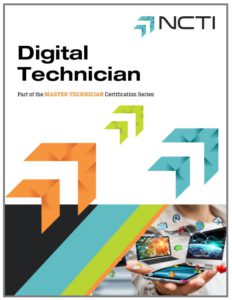Delivery: Online |
College Credit: 3 Credit Hours |
Est. Length: 18 Seat Hours
Price: $740.00 |
Equivalency Exam: $125.00

Course Overview
The NCTI Digital Technician course is an advanced training program designed to elevate a broadband technician’s understanding of digital technology beyond the physical equipment.
While installers connect boxes, Digital Technicians understand the language of the signal itself. This course provides a deep dive into the math and logic of broadband, covering Binary and Hexadecimal numbering systems, Boolean algebra, and Analog-to-Digital (A/D) conversion. Students will master the physics of data transport, examining advanced modulation schemes like QAM and OFDM, identifying bandwidth limitations, and exploring the protocols (MPEG and IP) that power modern IPTV services.
Who Should Attend:
- Headend Technicians
- Network Maintenance Techs
- Aspiring Network Engineers
- Technicians preparing for Master Certification
What You Will Learn
Upon completion, students will possess the theoretical knowledge to troubleshoot complex digital impairments and understand the architecture of future-proof networks.
Core Competencies:
- Digital Fundamentals: Master the logic gates, binary codes, and hexadecimal systems that form the foundation of digital communications.
- Modulation Mastery: Differentiate between modulation schemes (QAM, VSB, OFDM) and explain how they maximize RF spectrum and channel bandwidth.
- Signal Quality: Interpret digital measurements (MER/BER) to determine corrective actions and distinguish between digital channel power and analog amplitude.
- Compression & Transport: Identify MPEG standards (MPEG-2/MPEG-4), understand data stream composition, and the role of the Internet Protocol (IP) suite.
- Next-Gen Video: Explain the architecture of IPTV, disrupting legacy delivery models with device-agnostic content distribution.
Certification and Benefits
Academic and Career Advancement
This course offers significant value for career-minded technicians, providing 3 hours of college credit.
Additional Benefits:
- Certification Path: Credits apply toward the prestigious NCTI Master Technician certification.
- Industry Recognition: Receive the NCTI Certificate of Graduation.
- Diagnostic Logic: Move beyond “swapping equipment” to understanding why a digital signal fails.
Course Outline
Module 1: Fundamentals of Digital Communications
- Applying digital tech to network models.
- Logic gates, character codes (Binary/Hex), and data compression.
- Analog-to-Digital conversion basics.
Module 2: Modulation and Measurement
- Digital Modulation: Pulse Code Modulation (PCM), QAM, and modulating OFDM subcarriers.
- Channel Quality: Defining measurement values, adjusting amplitude, and loading downstream frequency spectrums.
- Testing: Using digital modulation test instruments to interpret signal health.
Module 3: Network Capacity & Standards
- Capacity Management: Improving spectrum efficiency and controlling source content.
- MPEG Standards: The Moving Pictures Expert Group, Systems Layers, and assessing video quality.
Module 4: Protocols and IPTV
- The IP Suite: The Transport Layer and moving data over the internet.
- IPTV Concepts: Distributing content to non-stationary devices and addressing distribution challenges.
